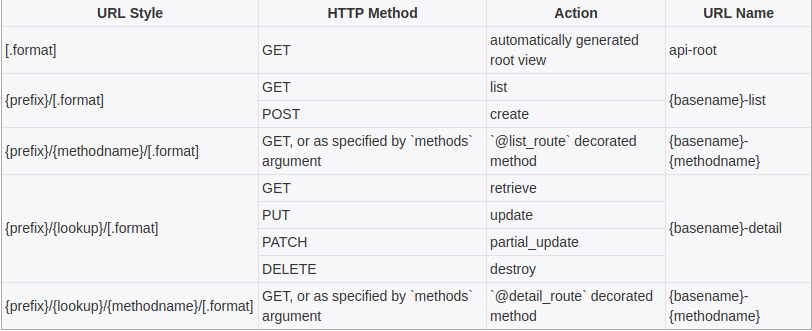i have tried to delete a single ManuscriptItem instance using Postman to perform my API requests on against the view below:
class ManuscriptViewSet(viewsets.ModelViewSet):
"""Handles creating, reading and updating items."""
authentication_classes = (TokenAuthentication,)
serializer_class = serializers.ManuscriptItemSerializer
permission_classes = (permissions.PostOwnManuscript, IsAuthenticated,)
def perform_create(self, serializer):
"""Sets the user profile to the logged in user."""
serializer.save(author=self.request.user)
def get_queryset(self):
"""
This view should return a list of all the manuscripts
for the currently authenticated user.
"""
user = self.request.user
return models.ManuscriptItem.objects.filter(author=user)
def destroy(self, request, *args, **kwargs):
instance = self.get_object()
self.perform_destroy(instance)
return Response(status=status.HTTP_204_NO_CONTENT)
def perform_destroy(self, instance):
instance.delete()
The destroy and perform destroy functions are what I have attempted without success. This is what it returns when i tried:
{ "detail": "Method \"DELETE\" not allowed." }
This is how my URLs are currently registered:
router = DefaultRouter()
router.register('manuscripts', views.ManuscriptViewSet, base_name="manuscripts") # auto basename for models
router.register('manuscriptlibrary', views.ManuscriptLibraryViewSet, base_name="manuscript_library")
router.register('manuscriptsettings', views.ManuscriptSettingsViewSet)
urlpatterns = [
url(r'', include(router.urls))
]
I'm i modifying the ModelViewSet wrong do i need to use another approach because of the nature of ModelViewSet? i expected it to work on Postman when i used an Authorized user to Delete a ManuscriptItem instance. In the docs it said Destroy() method can be used.
Additional information
The URL used is:
The model instance to be deleted from:
class ManuscriptItem(models.Model):
"""Represents a single manuscript's content"""
author = models.ForeignKey('accounts_api.UserProfile', on_delete=models.CASCADE)
title = models.CharField(max_length=255)
content = models.CharField(max_length=99999999)
def __str__(self):
"""Django uses when it needs to convert the object to a string"""
return str(self.id)
The way i have tried sending delete requests on postman with json:
{ "manuscript": 7, }
Results: Delete Method not allowed
{ "id": 7, "author": 5, "title": "niceone", "content": "niceone" }
Results: Delete Method not allowed
Additional Questions/Info:
Don't i need to specify the router register with a pk? I tried this but didnt work either:
router.register('manuscripts/{pk}/$', views.ManuscriptViewSet, base_name="manuscript_detail")
Postman says:
Allow →GET, POST, HEAD, OPTIONS


class ServerViewSet(viewsets.ModelViewSet): queryset = Server.objects.all() serializer_class = ServerSerializer url = f'http://127.0.0.1:8000/servers/5' response = requests.request( "DELETE", url, headers=headers, )– Cerellia